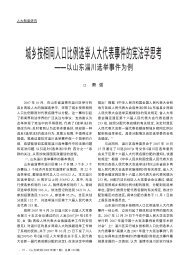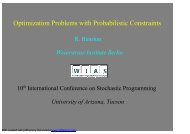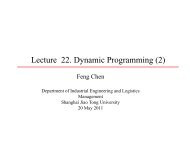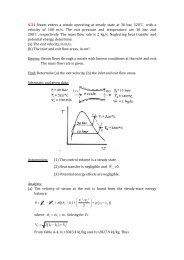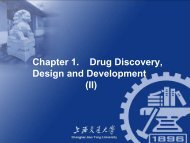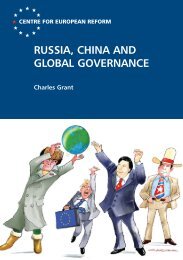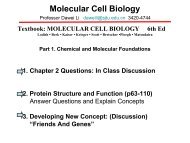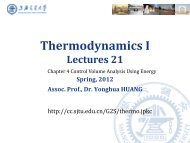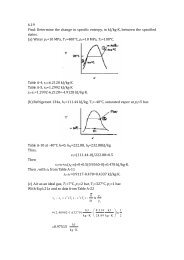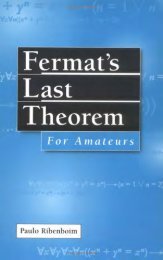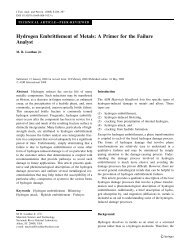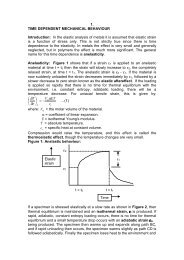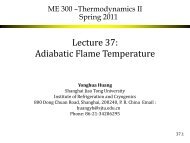The Making of the Apartheid Plan, 1929-1948* - CC
The Making of the Apartheid Plan, 1929-1948* - CC
The Making of the Apartheid Plan, 1929-1948* - CC
Create successful ePaper yourself
Turn your PDF publications into a flip-book with our unique Google optimized e-Paper software.
386 Journal <strong>of</strong> Sou<strong>the</strong>rn African Studies<br />
Downloaded by [Shanghai Jiaotong University] at 18:42 19 September 2012<br />
A Racist Policy without Racists?<br />
While Eiselen and o<strong>the</strong>rs stressed culture as <strong>the</strong> foundation <strong>of</strong> CNE and <strong>the</strong> political<br />
programme, a section <strong>of</strong> <strong>the</strong> Nationalist intelligentsia emphasised race. Invariably <strong>the</strong>ir<br />
point <strong>of</strong> departure was ‘racial purity’ as <strong>the</strong> foundation <strong>of</strong> white supremacy. It is sometimes<br />
suggested that such ideas were derived from <strong>the</strong> Nazi ideology that swept through Germany<br />
in <strong>the</strong> 1920s and 1930s. However, National Socialism had few adherents among <strong>the</strong><br />
intelligentsia. <strong>The</strong>re was broad support in South Africa for ‘race purity’, even among<br />
liberals, including Alfred Hoernlé and <strong>the</strong> editorial committee <strong>of</strong> Forum, but <strong>the</strong> biological<br />
variant <strong>of</strong> racism remained a fringe phenomenon.<br />
Piet Cillié, toge<strong>the</strong>r with Hendrik Verwoerd <strong>the</strong> most articulate apar<strong>the</strong>id apologist,<br />
wrote in 1952 that ‘South Africa was remarkably free from racial mythologies.’ For him,<br />
<strong>the</strong> Afrikaners’ desire to survive was a far stronger and more indestructible feeling than race<br />
prejudice. ‘Like <strong>the</strong> Jews in Palestine and <strong>the</strong> Muslims in Pakistan, <strong>the</strong> Afrikaners had not<br />
fought <strong>the</strong>mselves free from British domination only to be overwhelmed by a majority <strong>of</strong><br />
a different kind. Eventually we shall give that majority its freedom, but never power over<br />
us … <strong>The</strong>y [<strong>the</strong> blacks] will not get more rights if that means rights over and in our lives.’ 62<br />
<strong>The</strong>se can be seen as self-serving statements, but L. E. Neame, liberal editor <strong>of</strong> <strong>The</strong> Cape<br />
Argus and author <strong>of</strong> a book on apar<strong>the</strong>id, made <strong>the</strong> same point. Writing from a comparative<br />
perspective, he took issue with <strong>the</strong> argument that apar<strong>the</strong>id was based solely on <strong>the</strong> claim<br />
that <strong>the</strong> white race was inherently superior to all o<strong>the</strong>rs. An unreasoning prejudice against<br />
colour was not <strong>the</strong> root <strong>of</strong> <strong>the</strong> matter. <strong>The</strong> problem is ‘national ra<strong>the</strong>r than pigmental… <strong>The</strong><br />
motive is not detraction but defence.’ 63<br />
<strong>The</strong> Nationalist academic with <strong>the</strong> most explicitly racist <strong>the</strong>sis, both in terminology and<br />
<strong>the</strong> practical suggestions he <strong>of</strong>fered, was Ge<strong>of</strong>f Cronjé, a Pretoria sociologist. Perhaps<br />
because his books appeared just before <strong>the</strong> 1948 election, analysts have mistakenly thought<br />
that he was an influential figure. But he had stronger ties to <strong>the</strong> extra-parliamentary,<br />
pro-Nazi Ossewa Brandwag movement than to <strong>the</strong> NP during <strong>the</strong> war years, and had no<br />
standing in D. F. Malan’s inner circle. (He was one <strong>of</strong> <strong>the</strong> few Nationalist academics who<br />
declined to send a submission to <strong>the</strong> committee that drew up <strong>the</strong> so-called Sauer report.)<br />
He went much fur<strong>the</strong>r in <strong>the</strong> expression <strong>of</strong> his racial obsessions than almost any o<strong>the</strong>r<br />
Nationalist academic – John Coetzee calls him ‘crazy’ 64 – but how much his ideas resonated<br />
at a grass-roots level still has to be examined.<br />
<strong>The</strong> strongest and most enduring part <strong>of</strong> <strong>the</strong> apar<strong>the</strong>id ideology was <strong>the</strong> construct <strong>of</strong><br />
liberal nationalism and <strong>the</strong> associated appeal to an ethical form <strong>of</strong> survival. Here, <strong>the</strong> most<br />
articulate exponent was N. P. van Wyk Louw, <strong>the</strong> leading intellectual in <strong>the</strong> Nationalist<br />
movement. He was initially attracted to National Socialism but abandoned it by <strong>the</strong> end <strong>of</strong><br />
<strong>the</strong>1930s. As in <strong>the</strong> case <strong>of</strong> General Hertzog and many o<strong>the</strong>rs, his faith in Westminster-style<br />
liberal democracy and its tendency towards majoritarianism received a severe shock in 1939<br />
when General Smuts took South Africa into <strong>the</strong> war on a split vote. However, he did not<br />
reject <strong>the</strong> fundamental liberal principles <strong>of</strong> liberty and equality.<br />
In seeking a solution to <strong>the</strong> racial issue in South Africa, his point <strong>of</strong> departure was <strong>the</strong><br />
impasse in <strong>the</strong> country and <strong>the</strong> impossibility <strong>of</strong> applying <strong>the</strong> principles <strong>of</strong> Westminster-style<br />
democracy <strong>the</strong>re. ‘It was <strong>the</strong> typical tragic situation <strong>of</strong> history: two “rights” [<strong>the</strong> white and<br />
62 J. C. Steyn, Penvegter: Piet Cillié van Die Burger (Cape Town, Tafelberg, 2002), pp. 68–72. See also <strong>the</strong> views<br />
<strong>of</strong> Cillié’s predecessor, P. A. Weber, ‘Die Burger —SyStryd, Invloed en Tradisie’, in J. P. Scanell (ed),<br />
Keeromstraat 30 (Cape Town, Nasionale Boekhandel, 1965), pp. 18–38.<br />
63 <strong>The</strong> article was re-published by <strong>the</strong> Journal <strong>of</strong> Racial Affairs,1,6(1954), pp. 45–47. See also Adam and Giliomee,<br />
Ethnic Power Mobilised, pp. 61–82.<br />
64 J. M. Coetzee, ‘<strong>The</strong> Mind <strong>of</strong> Apar<strong>the</strong>id’, Social Dynamics, 17, 1 (1991), p. 30.



